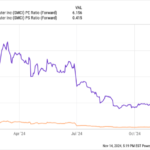Gain and Loss in the Market
During the past two trading sessions, shares of Semler Scientific (SMLR), a smaller medical technology company, saw a robust 38% surge, driven by its recent decision to include Bitcoin in its primary reserve assets. Currently, the company holds 581 Bitcoins valued at around $40 million, pushing its market cap to $227 million. Despite this week’s strong performance, SMLR experienced an 8.5% decline today, retracing some gains. However, since its IPO in early 2014, the stock has delivered a significant 360% return to investors.
Bitcoin as an Investment
In a recent press release, Eric Semler, the company’s chairman, expressed confidence in Bitcoin as a store of value and an attractive investment option. The digital asset, with a market cap of $1.3 trillion, has shown remarkable growth, appreciating over 20,000% in the past nine years. With a limited supply capped at 21 million tokens, Bitcoin’s decentralized nature and scarcity offer a unique value proposition despite its inherent volatility.
The recent approval by the U.S. Securities and Exchange Commission (SEC) for several spot Bitcoin ETFs is expected to draw increased institutional interest, further solidifying Bitcoin’s status as a hedge against inflation and a store of value. Notably, companies like MicroStrategy (MSTR), Tesla (TSLA), Block (SQ), and PayPal (PYPL) have all made significant investments in Bitcoin, leveraging its growth potential.
The Financial Picture
Despite revenue falling by 13% to $15.9 million in Q1 of 2024, Semler managed to cut its operating expenses by 25%, leading to a net income of $6.1 million or $0.88 per share. An analysis of SMLR stock by a single analyst suggests a “Strong Buy” rating with a target price of $45, signaling a potential 50.4% upside from current levels.
Looking ahead, Wall Street projects Semler to achieve adjusted earnings of $1.96 per share by the end of 2024. However, with a forward price-to-earnings ratio of 17x and an expected earnings decline of 27% year-over-year, the stock appears relatively expensive based on future earnings expectations.





